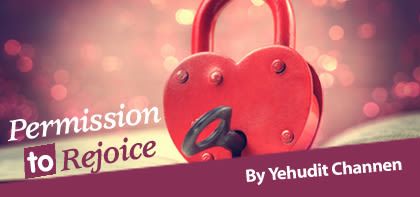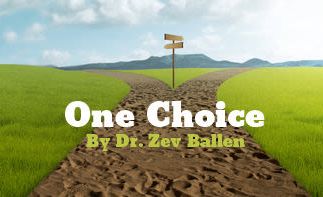
Permission to Rejoice
“I just want to be happy,” I wailed. My father bristled, “Who gives you the right to be happy?” I refused to reply because I didn't understand the question...

When I was growing up, happiness was not a given. My parents were children of immigrants who had escaped from Russian pogroms to a life of living with all they had lost.
Like many Jewish kids of my generation, I grew up in a home crammed with the emotional baggage of generations past.
My mother seemed happier than my father, keeping busy with hobbies and cooking. Yet my father made us all anxious with his silences and sudden outbursts of anger. We never knew where he was on his own personal Richter Scale and what might set him off.
One Sunday afternoon my brother and I were running around the house playing tag. Suddenly my father called us from the living room, demanding we come and watch what was on television. We crept in nervously and were confronted with gruesome and horrifying footage of Auschwitz. I compared our frivolous game with the suffering of these victims and felt reproached for my silliness. When the film was over we didn’t go back to play.
One year I came home with an exceptionally good report card, but instead of the praise I was hoping for, my grades were used to reprimand my brother whose report card was not as good. I watched in mortification as the cause of my happiness became a weapon to hurt another.
 During my late teens I suffered through the usual angst, trying to find meaning in life and clarify what I wanted. I had friends, a car and a job but I was still mostly miserable. My father became aware of my continual moodiness and one day, exasperated, asked me, ”What is it you want?”
During my late teens I suffered through the usual angst, trying to find meaning in life and clarify what I wanted. I had friends, a car and a job but I was still mostly miserable. My father became aware of my continual moodiness and one day, exasperated, asked me, ”What is it you want?”
“I just want to be happy,” I wailed. My father bristled, “Who gives you the right to be happy?” I refused to reply because I didn’t understand the question and I could tell he was not expecting an answer.
Many years later I did find the recipe for happiness and I have followed it ever since. The main ingredients are: Torah, mitzvot and a lot of emuna. But it wasn’t until I began to read the wisdom of Rebbe Nachman that my happiness really blossomed. The first time I encountered one of his books was about ten years ago, when my daughter was in a coma. At that time my happiness was taking a long leave of absence. One morning in the month of Adar (when according to the Torah, happiness increases) I ran into a former student of my husband who was being discharged from the hospital after months of chemotherapy. We spoke for a while and he handed me the book Crossing the Narrow Bridge. “I want you to have this” he told me. “It can change your life.”
That book slammed me into another dimension. I learned that happiness is so paramount to serving God and so essential to a spiritual life that if necessary we must actually force ourselves to feel happy.
This was a complete repudiation of all I had learned as a child. I used to feel guilty if I was too happy, for how could I be happy if other people were suffering? Perhaps the very fact that I was happy could cause someone else pain! To be sad was to be compassionate; it was a sign of sensitivity and selflessness.
But now I learned that not only is it okay to be happy even if others are suffering, I’m even allowed to be happy if I myself am suffering! I’m not betraying anyone! In fact I’m helping people by being happy, I’m lifting them up by my positive attitude and giving over good vibrations. I’m also making myself a vessel for divine blessings and pleasing God by being His satisfied child.
For me, who used to get nervous whenever I felt really good, this was liberating and exhilarating! It was the permission I needed, divine evidence that found me not guilty for enjoying life! Hashem commands us to serve Him in joy and that gives us the permission — and in fact the obligation — to be happy. Hashem gives us the way, gives us the freedom and gives us the right.
I loved my father. He was a deep thinker and could be incredibly perceptive. But perhaps he thought that being happy was unfair to loved ones who could not or would not be happy. Perhaps he wouldn’t allow himself to have what he didn’t think he deserved. Or perhaps he was afraid to be happy because it might be taken away from him.
If the source of our happiness is our relationship with God, it can never be taken away. We had it before we were born, we have it now and we will have it forever. It is not an indulgence to be happy and it is not an illusion. It is a basic requirement of faith in God.








3/02/2017
Very inspiring – thank you!
I think many people, for one reason or another, feel like being happy is "wrong" or problematic somehow. Whether it's for the reasons you once felt or another reason, it's great that you emphasized how beneficial and important and necessary it is to be happy, both for yourself and others. Thank you!
3/02/2017
I think many people, for one reason or another, feel like being happy is "wrong" or problematic somehow. Whether it's for the reasons you once felt or another reason, it's great that you emphasized how beneficial and important and necessary it is to be happy, both for yourself and others. Thank you!
2/28/2017
A beautiful article!
Yehudit, your reminder that the source of our happiness is our connection to Hashem, cannot be understated.. If we constantly stay plugged in so to speak (connected to Him) then our happiness will be constant. Thank-you for sharing your experiences with your father, and how you were able to overcome the negativity and embrace a higher more elevated connection to Hashem, and the happening in our daily life! Even the upsetting and disappointing ones, are all fuel for growth and more awarenes.